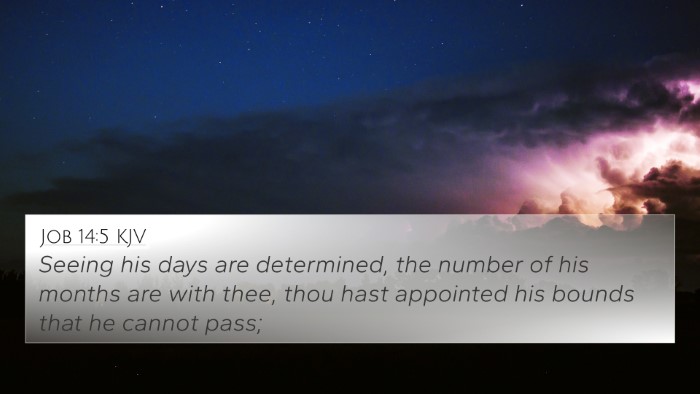Psalms 39:13 - Meaning and Interpretation
Bible Verse: Psalms 39:13
Text of the Verse: "O spare me, that I may recover strength, before I go hence, and be no more." (KJV)
Summary of Meaning
Psalms 39:13 expresses a profound sense of urgency and desperation in the plea to God for mercy before death arrives. This emotional cry reveals the psalmist's awareness of mortality and the desire for strength and respite during a time of distress.
Combined Insights from Public Domain Commentaries
Matthew Henry's Commentary
Matthew Henry remarks on the psalmist's acknowledgment of the brevity of life. He emphasizes that this verse reflects a request for God's intervention, highlighting the importance of divine mercy. Henry points out that the psalmist desires a temporary reprieve to gather strength, indicating a deep spiritual longing for God’s presence during trials.
Albert Barnes' Notes
Barnes provides an analysis of the plea made by the psalmist. He notes that the term "spare me" illustrates a genuine fear of impending death and a yearning for God's grace. This verse underscores the human experience of feeling overwhelmed and the need to recover strength before facing the finality of life.
Adam Clarke's Commentary
Adam Clarke highlights the poignant nature of this verse, reflecting on the themes of life, death, and divine mercy. He interprets the psalmist's request as a call for spiritual revival and strength. Clarke connects this desperation to the broader human condition, echoing sentiments of vulnerability and the desire for time to prepare before the end.
Key Themes in Psalms 39:13
- Mortal Awareness: The psalmist recognizes human frailty and mortality.
- Divine Mercy: A call for God's compassion in times of distress.
- Spiritual Renewal: A desire for strength to persevere through suffering.
- Temporal Respite: Seeking time to prepare for eventual death.
- Human Vulnerability: Reflecting on the experience of being overwhelmed.
Bible Verse Cross-References
- Psalms 90:12: "So teach us to number our days, that we may apply our hearts unto wisdom."
- James 4:14: "For what is your life? It is even a vapor, that appeareth for a little time, and then vanisheth away."
- Isaiah 38:10: "I said in the cutting off of my days, I shall go to the gates of the grave: I am deprived of the residue of my years."
- Psalms 51:12: "Restore unto me the joy of thy salvation; and uphold me with thy free spirit."
- 2 Corinthians 4:16: "For which cause we faint not; but though our outward man perish, yet the inward man is renewed day by day."
- Ecclesiastes 3:1: "To everything there is a season, and a time to every purpose under the heaven."
- Lamentations 3:25-26: "The Lord is good unto them that wait for him, to the soul that seeketh him. It is good that a man should both hope and quietly wait for the salvation of the Lord."
- Philippians 4:13: "I can do all things through Christ which strengtheneth me."
- Psalms 62:1: "Truly my soul waiteth upon God: from him cometh my salvation."
- Hebrews 4:16: "Let us therefore come boldly unto the throne of grace, that we may obtain mercy, and find grace to help in time of need."
Understanding the Connections between Bible Verses
In this section, we explore the connections between Bible verses that relate to Psalms 39:13. The cross-referencing establishes an inter-Biblical dialogue that enhances understanding of the themes of mortality, divine mercy, and strength amidst trials.
1. Thematic Bible Verse Connections
Several verses provide insights into human frailty and the desire for divine support. For instance, Psalms 90:12 directly relates to the psalmist's meditation on the brevity of life and the call to seek wisdom in our days.
2. Comparative Analysis of Related Verses
The verse from James 4:14 emphasizes the transient nature of life, mirroring the urgency found in Psalms 39:13. Likewise, the plea for divine restoration in Psalms 51:12 aligns with the desire implicit in our primary verse for strength to endure.
3. Scriptural Cross-Referencing
Utilizing tools for Bible cross-referencing allows deeper engagement with the text, facilitating a fuller understanding of how these verses interact and underline the overarching message of reliance on God.
Conclusion
Psalms 39:13 resonates deeply as it encapsulates the human struggle against mortality while invoking the grace of God for strength and healing. Engaging with this verse through Bible concordance and cross-reference Bible study can enrich one's spiritual journey and enhance appreciation of the sacred texts.








